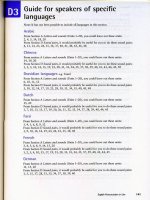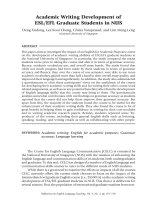Improving pronunciation in EFL ESL students
Bạn đang xem bản rút gọn của tài liệu. Xem và tải ngay bản đầy đủ của tài liệu tại đây (261.37 KB, 6 trang )
ANNOTATED BIBLIOGRAPHY
ASSIGNMENT
Improving pronunciation in EFL/ESL students
Instructor: Duong Thi Duyen, M.A
Full name: Duong Thi Ngoc Diem
Student Code: B1705859
Course Code: XH299
June 12, 2020
Improving pronunciation in EFL/ESL students
Introduction
No one can deny that English has become more and more important as a global language
crossing many international boundaries. The highest target when learning foreign languages
generally and learning English particularly perhaps is to use that language fluently and
appropriately in oral communication. One cannot achieve that goal if he is not good at
speaking skills, especially pronunciation skills. Gilakjani (2012) indicated that learners with
good English pronunciation are likely to be understood even they make errors in other area,
whereas those who have bad pronunciation will not be understood, even if their grammar is
perfect. Because English is not a phonetic language, once we pronounce a word incorrectly, it
may change the meaning of that word and make some unwanted misunderstanding in our
conversation. English pronunciation, including sound production, syllable stress, English
intonation patterns, and spoken rhythm, maybe is a challenging skill if we do not find out an
appropriate technique to learn and improve.
After considering the articles carefully, I find that some available sources benefit our
pronunciation learning process a lot. Improving pronunciation in EFL/ESL students by using
English songs, English movies and English games, how to apply them and how motivating
and effective they are, are what I wish to explore in my paper.
Summaries
Aini, H. W. N., Basri H. & Hastini (2013). Improving students’ pronunciation of alveopalatal
sounds through English songs. English Language teaching Society, 1(1), 1-13. Retrieved
from />This article examines that English songs can help students improve their pronunciation of
alveopalatal sounds at SMA Negeri 4 Palu. The objective of the study focused on improving
pronunciation of alveopalatal sounds such as /ʃ/, /ʒ/, /tʃ/, and /dʒ/. In the pre-experimental
research part, a class (which was chosen randomly) of 37 eleventh-grade students sat in a
pretest to be identified their prior ability in pronouncing alveopalatal sounds. The test
included 2 parts: an oral test with 15 items and a multiple test with 5 items. After the pretest,
students were instructed to enhance their pronunciation of alveopalatal sounds by listening to
1
English songs. After 8 treatment meetings, a post test was organized to know the significant
improvement of the process. By statistically analyzing the data from Table 2 and Table 3, the
researchers found that there was significant progress among the students: their mean score
from 48.2 in the pretest improved to 79.3 in the post test. Therefore, the use of English songs
can improve students’ ability in pronouncing alveopalatal sounds.
Nurhayati, D. A. W. (2015). Improving students’ English pronunciation ability through Go Fish
game
and
Maze
game.
Dinamika
Ilmu,
15(2),
215-233.
Retrieved
from />The purpose of this study is to investigate whether Go Fish and Maze game can improve the
students’ English pronunciation ability and how effective they were, and to examine the
strengths and weaknesses of those games in improving the students’ English pronunciation
ability. 19 students, who were the TK B1 in a kindergarten of ISLAM Al-Irsyad Madium,
signed to join this study. After sitting in a pre-test, the participants were turned onto two
cycles of the program. In the first cycle, the Go Fish Game was conducted. In this part, each
student played the game under the researcher’s construction. Then, the students had to speak
the words and ask their friends for cards to match with the ones he had. Moreover, all students
were asked to read out loud the cards that they got in front of their friends at the end of the
game. In cycle 2, the Maze Game was organized to improve learners spelling and
pronunciation. During the game, students seemed to plant a tree by pronouncing the words
related to the parts of the tree such as the leaf, flower, fruit, root, and so on. Besides, they had
to sit in a post test at the end of every cycle. At that point, the Action Research Method was
used in collecting and analyzing the data. The statistic indicated that there was significant
advancement among the participants. The author found that besides this method created joyful,
energetic, and motive activities that could help students interesting in improving their ability
in pronunciation, the limited time and the condition of the teacher were considered as
weaknesses in this study.
Sihombing, H. B. M. & Purba, M. (2018). Improving students’pronunciation mastery through
learning by using medias (English songs and English movies). Jurnal Darma Agung, 26(1),
591-599. Retrieved from
/>2
This article aims to investigate how well using relate media such as English songs and English
movies was in developing students’ ability in pronunciation. The question that the authors
tried to clarify is: “How well does Using relate media such as English songs and English
movies improve students’ pronunciation?”. To begin, thirty five (35) students in the fourth
semester of English Department of Letter Faculty in Darma Agung University sat in a pre-test
to be examined their levels. Then, two cycles, Cycle I and Cycle II, were conveyed. Every
cycle included four steps (planning, acting, observing, and reflecting) that came with the
treatment conducting in 10 meetings altogether. A questionnaire was used to check how better
students were at the end of every cycle. As can be seen, Table 4.1.1 showed the results of the
pretest and the two post tests. Table 4.2.3 showed the analysis of the questionnaire results
based on some criteria mentioned in the study. These tables indicated that the average score of
55,3 in pretest then was improved into 74,17 on Cycle I, and into 85,4 in Cycle II. Therefore,
the application of media by listening to English songs and English short movies was effective
on pronunciation improvement among students. However, the authors identified themselves
that the process of collecting was time consuming since the researcher had to test and check
students’ pronunciation one by one.
Supeno, (2008). Using songs to improve students’ pronunciation. TEFLIN International Conference,
65(1), 339-346. Retrieved from
/>This article tries to shed light on the effects of English songs on secondary students’
pronunciation improvement in certain sounds. The participants included 30 students of SMA
Hang Tuah 2 Surabaya in Indonesia. These students always have difficulties in distinguishing
between the vowel sound /i:/ and /ɪ/, pronouncing the consonant /dʒ/ in final sound, or
monophthongizing the diphthong /ai/. To begin, students studied words and phrases from the
songs’ lyric and then listened to the songs a few times. After that, many activities such as
filling in the gaps or categorizing the words according to the sounds were organized based on
songs’ rhythm to help learners have chances to practice. To finish, they took part in a survey
to show their opinions regarding to effectiveness of improving pronunciation by using English
songs by answering a questionnaire. Results showed that 25 out of 30 participants absolutely
agreed that students not only enhanced their pronunciation but also felt comfortable and
relaxing during the learning process. The researcher recommended that teachers should take
3
into account different aspects levels, age, reference as well as the difficulty of the songs and
their rhythm when choosing a song. Advanced students and those who taking pronunciation
courses were suggested to use these practices.
Conclusion
As an English learner for several years, I have been applying those methods in my learning
process. However, thanks to the four articles that I have summarized, I find them more useful
and informative. The studies above revealed that English songs, English movies and English
games can help learners in enhancing almost every perspective of their pronunciation namely
vowels, consonants and diphthongs. Moreover, rhythm, intonation, stress, and flow of the
word and even sentence are practiced simultaneously. Although the authors of the second and
the third article said that it was time consuming sometimes, I find it acceptable. Because if we
want to master something especially knowledge, we cannot achieve it within a short time.
Through the four articles, I can conclude that media is not simply a relaxing and entertaining
tool but also a great implement to improve our ability in English pronunciation. In my opinion,
it is not only helpful for me but also for those who need motivation and relaxing techniques to
help them besides their traditionally stressful learning methods.
4
References
Aini, H. W. N., Basri H. & Hastini (2013). Improving students’ pronunciation of alveopalatal
sounds through English songs. English Language teaching Society, 1(1), 1-13. Retrieved
from />Nurhayati, D. A. W. (2015). Improving students’ English pronunciation ability through Go Fish
game
and
Maze
game.
Dinamika
Ilmu,
15(2),
215-233.
Retrieved
from />Sihombing, H. B. M. & Purba, M. (2018). Improving students’pronunciation mastery through
learning by using medias (English songs and English movies). Jurnal Darma Agung, 26(1),
591-599. Retrieved from
/>Supeno, (2008). Using songs to improve students’ pronunciation, TEFLIN International
Conference, 65(1), 339-346. Retrieved from
/>
5









